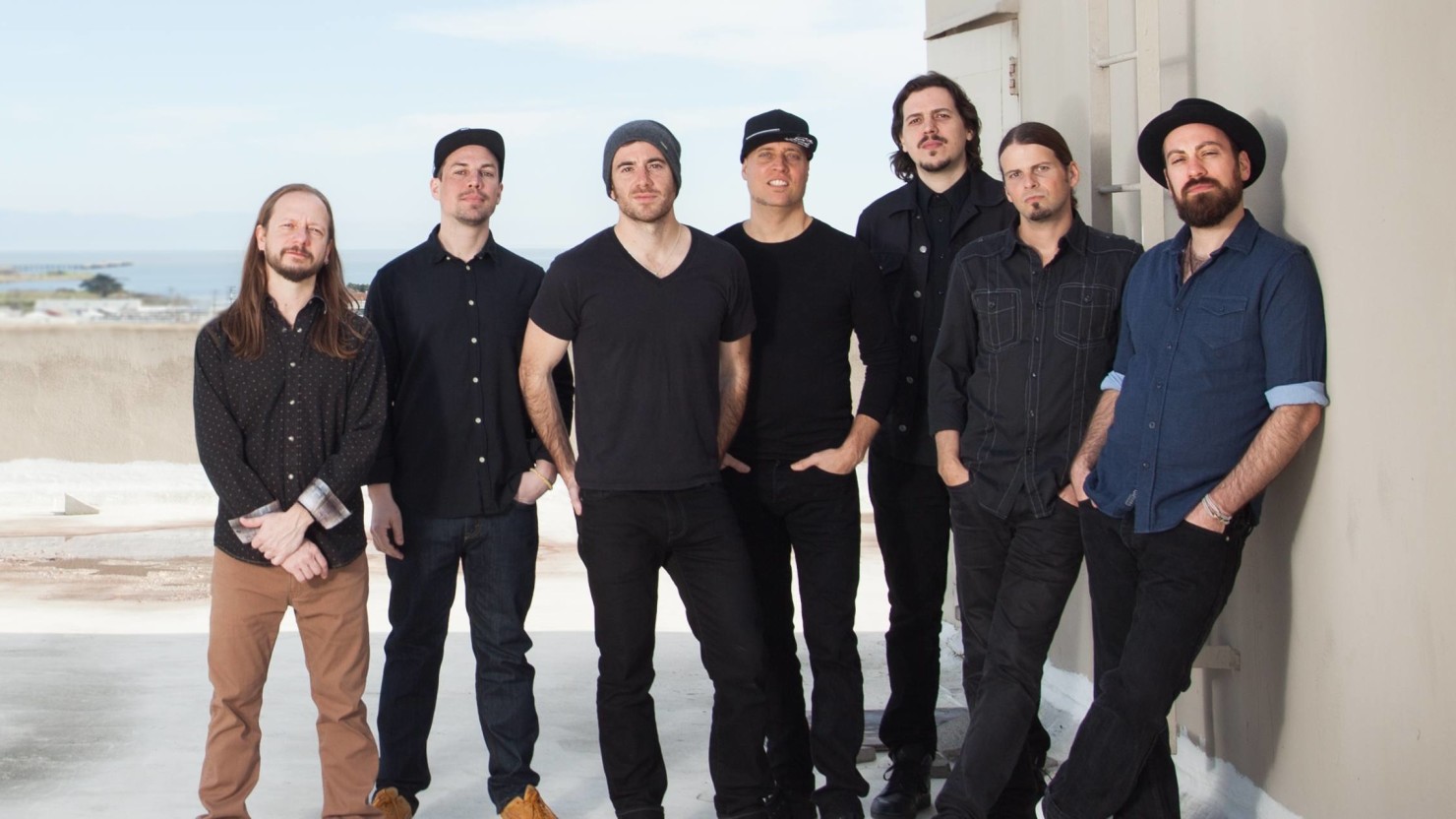The Motet in Motion

It was a late autumn afternoon, in 2015, and Lyle Divinsky had just played a low-key, solo acoustic gig at Springfield College in Massachusetts. On his way back home to Maine, Divinsky—a soul singer who’d just released his debut album—received a message from one of the members of The Motet. It was his first time speaking with anyone from the group, and they were interested in collaborating.
“I had just played a lunch study hall or something like that,” Divinsky says, one year and one studio album into that partnership with The Motet.
Things kicked into overdrive. Everything was set in motion—and the parts haven’t stopped moving, which makes sense since, at their core, The Motet make people move. The Colorado outfit plays kinetic dance music, with coiled guitar lines and rhythmic patterns that overlap and intertwine, creating tension, gathering energy and releasing it in controlled blasts. Motion and flux are part of the deal. But, as with all the best dance music, part of what keeps it all working is the sense of continuity within the change. And there’s been plenty of change recently for this band.
Last December, The Motet’s longtime singer and frontman Jans Ingber announced that he was leaving the group, amicably, to cultivate a more balanced home and family life. With that, a whole new set of variations and permutations kicked into effect, making 2016 a year that has been both in keeping with The Motet’s mode and unlike any other year in their 18-year existence. In the middle of recording their new record, Totem, released in July, the group tried out and hired Divinsky, 30, as their new vocalist. And then the band started cramming—researching, listening, petitioning each other with song choices—for their epic run of thematic Halloween shows. (This year’s focuses on the music of 1979.) The Halloween shows and the effort involved in picking and learning the material anchor much of the year’s energies for the members of The Motet, fueling their creativity and pointing them in new directions for the future.
The Motet, formed in 1998 by drummer and bandleader Dave Watts, started out doing percussion music—from AfroBrazilian samba to djembe ensemble pieces—and moved to playing tunes heavily influenced y West African and Afro-Cuban music, with deep polyrhythmic underpinnings. (Watts and two other early members of the group visited Cuba to immerse themselves in Batá drumming, part of the band’s whole study-up-and-synthesize approach to threading new elements into their music.) They’ve continued to shape-shift, stylistically spanning genres and continents, ever since.
Listen to “Sunu” off of their debut record, Breathe. At the song’s core, it’s a djembe rhythm, from Mali and Guinea, with deep, bass-like dun-dun drums and bell patterns, over which the crisp djembe plays offbeat accent. But it morphs into a slow funk-soul instrumental with wah-wah guitar, perky bass and organ, and a drum kit linking the West African percussion ensemble. Later on the record, the band shifts into Fela-inflected Afrobeat on “Jiti” and then into a groove-heavy, speed-racer rendering of Eddie Harris’ “Freedom Jazz Dance,” a knotted tune of circling intervallic leaps made famous by Miles Davis, which glides back into West African djembe mode before winding down. And then they launch into “Yogi’s Day Out,” a honky-tonk swing barnstormer, to close out the record, which is just to say that the band has always been comfortable working through changes, without seeming stitched together. Jump ahead to The Motet’s self-titled 2014 record and the band is a different beast—and yet still the same—fully onboard with the soul-funk, channeling Tower of Power, Stevie Wonder and Earth, Wind & Fire, all three of which, incidentally, were the focus of Motet Halloween shows (2003, 2002 and 2010, respectively).
“I think that with a band that’s growing, there tends to be consistent change going on as you have growing pains and you’re striving for different degrees of success,” says Watts. “We’ve always experienced that as a band—shifting and changing.”
As The Motet has bent, morphed, swerved and expanded its scope, so has the music culture at large. The group started performing Fela tunes and playing West African dance music just ahead of what would become an Afrobeat renaissance in America. In 2001, MCA reissued the Fela Kuti catalog, making dozens of formerly ultra-rare recordings available to a new generation of fans, as other like-minded bands like New York’s Antibalas gained an audience. The burst of interest culminated in the musical Fela!, which opened on Broadway in 2009.
“There was an Afrobeat revival that happened about 15 or 20 years ago,” says Motet bassist Garrett Sayers, who joined the band in 2002 after years on the jamband circuit with Miracle Orchestra. “It was such an exciting style that was somehow missed by most Americans, and we were just so excited to be a part of it.” 
The Motet’s move toward more explicitly funk- and soul-centric music made perfect sense coming from those starting points. Fela’s Afrobeat is famously shaped by African-American influence , all run through a filter that worked traditional Nigerian elements in as well. And American music fans can relate to the familiarity of the heavy funk foundation.
“Fela and others decided to mix that influence with their country’s heritage,” says Sayers. “To then have that come back to us again as funk fans—I can hear the James Brown in there, but it’s flipped on its head.”
Understanding that lineage—and paying tribute to it—is part of what’s at the core of The Motet’s musical philosophy. “As a drummer, that is something that I’m extremely conscious of,” says Watts. “I think that funk music is America’s African music, influenced directly by the movement of African rhythms and musical culture into the United States, going back to Congo Square [the one place where enslaved Africans were permitted to play their rich drum-based music].”
This year, the arrival of a new singer furthers The Motet’s evolution, dialing in a mellow soul vibe as a counterpart to the percussive funk. When he got the call to collaborate with The Motet in what was a sort of an unspoken tryout, Lyle Divinsky was deep into the launch of his own solo career.
Divinsky, who has grown from New York City street busking to performing on big stages, had been working on his record Uneven Floors when he reached a crossroads. “I put [the record] out in November, then, like two weeks later, I get a call from [keyboardist] Joey [Porter],” says Divinsky. “It was an amazing opportunity, and I’d been digging their music for a long time.”
In what sounds like a trial-by-fire test of one’s creative juices, The Motet sent Divinsky a track of music and asked him to take a shot at writing lyrics and a vocal melody.
“Watts sent me an instrumental, just to see how I would do,” says Divinsky. “Two days later, I sent back ‘The Truth.’” That was in mid-December. Two days after that, they sent him another tune, which became “Fool No More.” And two weeks later, in early January, they flew Divinsky out to Colorado to rehearse; it was his fir t time meeting most of them. A week after that, with Divinsky filling in after Ingber’s recent departure, the band went out for a two-week string of live dates. A month later, which included another two weeks of shows, The Motet was back in the studio to record the rest of Totem with Divinsky fully immersed in the project. “It was just as much fast family and fast friends as it was fast comfort within the music,” says Divinsky.

The Motet isn’t a band that necessarily expects new members to step in and entirely conform to a pre-existing template. Part of what refreshes the group is the result of a shifting bunch of players. The band has been a sextet at times, and they’ve ballooned to up to 10 and 12 members at times. The Motet is currently a seven-piece outfit—in addition to Watts, Sayers, Porter and Divinsky, there’s guitarist Ryan Jalbert, trumpeter Gabe Mervine, and Drew Sayers on tenor sax. But The Motet could mushroom into another iteration before long, and it probably will. In certain ways, they have also grown into Colorado’s house band, spawning countless side-projects, jam sessions and sit-ins. One former saxophonist, Dominic Lalli, went on to form livetronica outfit Big Gigantic, who the members of The Motet have continued to collaborate with on occasion.
“We’ve always been an evolving band and we’ve always embraced that,” says Sayers, noting that Watts and his crew work to synthesize different perspectives and styles that draw from varying but related traditions. For his part, Divinsky views his contribution as perhaps a slow-drip infusion of his trademark soul sound. It’s the flip side to what The Motet has already clearly mastered. And, in the process, Divinsky gets to expand on a branch of something that he was already doing.
“Funk is the extrovert, the party, the social, the fun and carefree side. Soul is the introspective, reflective side,” says Divinsky. “They’re super related. It’s all reciprocal, energy-based performance.”
The engine of the music fires on its own, with all the players locked together like gears and with Watts supplying a piston-like combustion thanks to his versatile and propulsive drumming, but the whole operation gets an external power source from the audience. Longtime Motet fans have followed the band as they’ve shifted gears and moved in new directions, so—while some newer listeners might get a mild sense of whiplash with the stylistic changes—the seasoned fans expect to be surprised.
Watts—who continues to serve as the ensemble’s bandleader and arranger— says that keeping a large group together is outside of the skill-set of most musicians, who tend not to focus on that on while mastering their art.
“You can’t really go to school for that,” says Watts of his elusive mix of people-pleasing, persuasion and leadership. “There’s a lot of give and take. There’s psychology there—there’s interpersonal relationships there. It’s about everyone feeling like they’re being heard.”
The members of The Motet have also always been happy to immerse themselves in the music of other artists. For years, their annual Halloween shows consisted of elaborate distillations of one artist’s material. They’ve covered The Beatles, Talking Heads, Madonna, Michael Jackson, Prince, the Grateful Dead and others. Since 2013, they’ve been performing “mixtape” shows that zero in on the music of a specific year. So far, the band has stayed narrowly focused in time, perhaps to maximize the funk potential, having interpreted music from 1980, 1977 and 1975. But the practice and in-depth study of the covers has led to new, original Motet music.
“The Halloween show is always a huge event for us,” says Sayers. “One of the reasons we got into writing music in the last few years was because we have this system of digging up old funk songs that were never huge.”
After spending hours listening and learning and performing what they consider to be the work of the masters, the band always has a renewed sense of possibility about how to use what they’ve learned to inspire their own writing. According to Watts, the band doesn’t even really need to discuss or analyze the creative lessons learned from what is essentially a musical boot camp leading up to Halloween each year. “We would spend three months studying every album by Parliament-Funkadelic and then choosing our favorite songs,” says Watts. “When you put that much time into one group, it naturally just seeps into your being and comes out organically.”
In addition to the band’s study- filled lead-up to their Halloween shows and a set of yearly dates at the iconic Red Rocks Amphitheatre, as well as their busy, steady tour schedule, The Motet aims to write and record an album of new material each year. The next record will almost certainly mark another transition for the group. Divinsky, who’s been an East Coaster until now, is even planning to move to Colorado after Thanksgiving.
“We’re all transplants to Colorado,” says Watts. “Most of us grew up on the East Coast. Most of us moved to Colorado because we were all tired of that rat race. There’s a reason that Colorado has such an uplifting vibe and a lot of the music that comes out of here has it, too. That’s the general feeling of the people here.”
With Divinsky soaking up some mountain air and fully engaged with the band in preparation of the Halloween shows and the writing of new material, fans can be on the lookout for yet another twist from The Motet on their next album.
“We already have a bunch of ideas cooking for the next record,” says Divinsky. “I’m looking forward to the next one when I’m able to be in it from the ground up.”



















